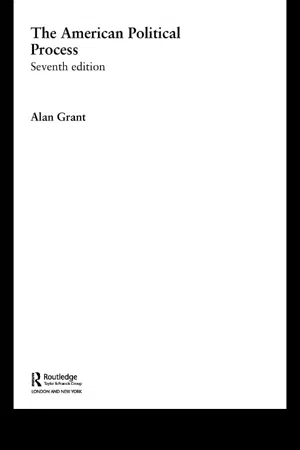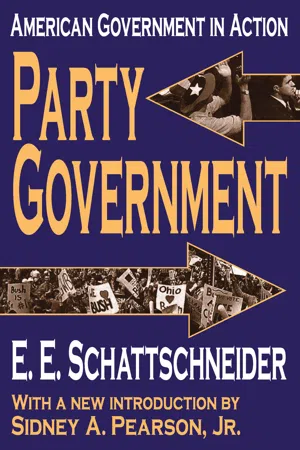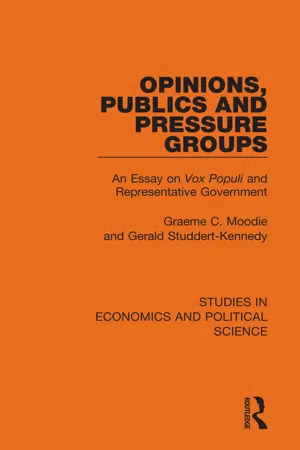Politics & International Relations
Successful Pressure Groups
Successful pressure groups are organizations that effectively influence government policies and decisions by mobilizing public support, lobbying policymakers, and using various advocacy tactics. They often have clear goals, strong leadership, and the ability to build coalitions with other groups. Successful pressure groups can bring about legislative changes, shape public opinion, and hold governments accountable.
Written by Perlego with AI-assistance
Related key terms
3 Key excerpts on "Successful Pressure Groups"
- eBook - ePub
- Alan Grant(Author)
- 2003(Publication Date)
- Routledge(Publisher)
Pressure groups also provide, as we have seen, a great deal of information and specialised knowledge which is put at the disposal of the formal institutions. Pressure groups make a positive contribution to policy-making and administration by meeting legislators and officials on a regular basis, by submitting proposals for examination and by appearing before congressional hearings to provide evidence on specialised areas. They also act as intermediaries between government and the public, and relate the reactions of various sections of the community to official policies and current issues. Pressure groups are channels of communication by which government is kept permanently responsive to public opinion between election campaigns, as they ensure that all the ‘access points’ of the formal structure are fully informed on the state of the body politic.If these positive benefits result from pressure group activity, what explains the continuing suspicion among the public? Even the name, ‘pressure’ group, implies to some people the use of undue or illegitimate influence, and others feel that these organisations are invariably selfish and must be advocating policies which conflict with the general or public interest, however that is construed. The media often use the term ‘special interests’ to suggest that certain groups have been given a special and advantaged position in the policy-making process. Perhaps the most trenchant criticism of pressure group politics is the fact that, unlike the formal system of democracy, in which there are equal voting rights, there is often grossly inequitable representation. A major problem of the pluralist system is that those groups with large memberships or financial resources tend to have a much more powerful voice and more open access to the decision-makers. Large interest groups, such as business organisations and trade unions, have, it is often argued, a disproportionate amount of influence, while others, such as the disabled, the ethnic minorities, the unemployed and low-income groups, are difficult to organise into effective pressure groups, have insufficient financial support, or are inarticulate and unable to promote and defend their interests as well. One consequence of this has been, of course, the establishment of many promotional groups so that these less powerful elements of society do not go totally unrepresented. - eBook - ePub
Party Government
American Government in Action
- E. Schattschneider(Author)
- 2017(Publication Date)
- Routledge(Publisher)
Parties and pressure groups differ as to method, therefore, and the method used in turn dominates the objectives of these types of political organization. In its nature the method of controlling government by nominating candidates who contest elections involves total control of the government, though it may not be perfectly successful. If a party wins an election it wins general control of the policies and activities of the government. The parties play for the supreme stakes of power. On the other hand, pressure groups are not organized to take over a government in its entirety; they seek to accomplish specific, relatively narrow tasks, to influence policy at selected points, and do not aim at winning the general power to govern. Compared with the responsibilities assumed by the parties, the function of pressure groups is extremely restricted. A pressure group may content itself with bringing about a single result, the passage of one bill, the defeat of one tax increase, the reversal of a particular executive ruling, the construction of a special bridge, or the adoption of a particular tariff rate on a special commodity, though some pressure groups sponsor policies more broadly conceived than those promoted by others. If the party is a corporation which takes possession of the ship by virtue of a mandate from the owners, the pressure group is little more than a stowaway smuggled aboard with the cargo.Pressure Tactics
Before proceeding with the discussion of the implications of the fact that parties fight election campaigns and pressure groups avoid them, it is necessary to examine more closely the method of pressure politics. How is it possible to influence public policy without winning elections? The method of pressure politics, like all other political methods, must meet one fundamental requirement if it is to be adopted widely. It must work easily.How can organized minorities or groups, unable to win elections or unwilling to make the effort to do so, induce the government to adopt the policies they advocate? Obviously a pressure group might influence policy by creating a general opinion - eBook - ePub
Opinions, Publics and Pressure Groups
An Essay on 'Vox Populi' and Representative Government
- Graeme C. Moodie, Gerald Studdert-Kennedy(Authors)
- 2021(Publication Date)
- Routledge(Publisher)
3 No discussion of representation is therefore complete without account being taken of pressure groups. This judgment applies also to any discussion of the nature of opposition in general, and in any particular regime. Indeed, as we shall argue below, pressure groups derive much of their influence and status from their capacity successfully to oppose governments, while what is opposed, by which groups, and by what means, are among the salient features which distinguish different political systems. Finally, it may be argued, legitimate popular power, whether asserted by a majority or, especially, by a minority striving to become or persuade the majority, is likely to be nebulous without the opportunity to mobilize and organize, including the formation of pressure groups, and to create clienteles or attentive publics.With none of the claims stated in the previous paragraph do we wish directly to quarrel. But, if they are taken as statements of fact about British politics, or about any country’s politics for that matter, then it must be pointed out that they are not necessarily nor invariably true. To show why this is so we must survey the pressure group system.1 Thus R. T. McKenzie has concluded that ‘pressure groups ... are a far more important channel of communication than parties for the transmission of political ideas from the mass of citizenry to their rulers’, in his ‘Parties, Pressure Groups and the British Political Process’, Political Quarterly, XXIX, 1958. For a good brief discussion of this impact on legislation, see S. A. Walkland, The Legislative Process in Great Britain (Allen & Unwin, 1968), Chs. Ill and IV.2 PEP, Advisory Committees in British Government (Allen & Unwin, 1960), pp. 112-13.3 See Samuel H. Beer, Modem British Politics
Learn about this page
Index pages curate the most relevant extracts from our library of academic textbooks. They’ve been created using an in-house natural language model (NLM), each adding context and meaning to key research topics.


